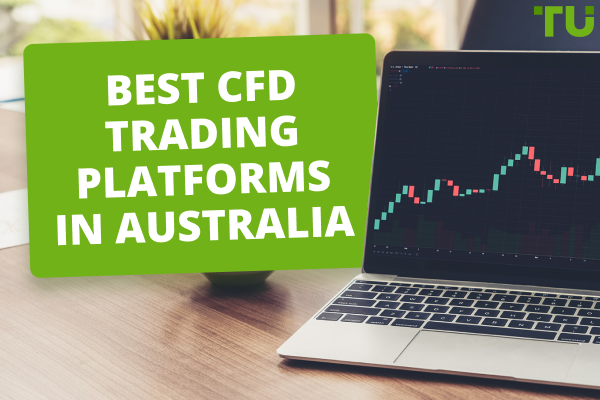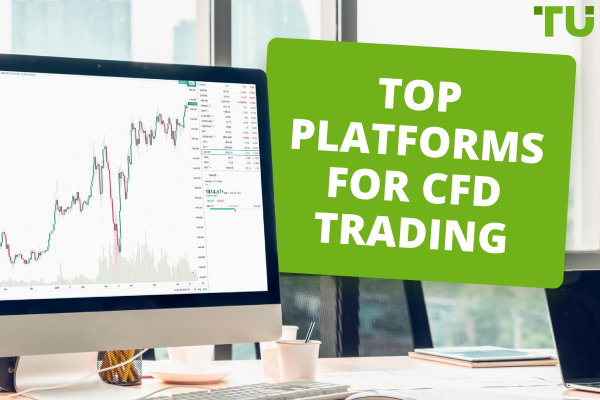CFD Trading in the UK – A Full Beginner’s Guide
CFD trading gained a lot of popularity among traders in the UK in recent years because they are attracted by the possibility of gaining a lot higher profits than their initial investment.
We created this article to help them learn the most important aspects of CFD trading UK, how to trade CFD UK, and what is the best CFD trading platform in the UK.
Do you want to start CFD trading? Open an account on FxPro!What is CFD Trading?
A CFD (Contract for Difference) is a short-term contract between an investor (a buyer) and a spread betting firm or an investment bank (seller). It allows traders to profit from the price fluctuations of an asset without actually buying it.
Contracts for difference (CFDs) are financial derivatives that enable traders to make assumptions on short-term price fluctuations. Some advantages of CFD trading include the ability to trade on margin and the ability to go short (sell) if you believe prices will fall or long (buy) if you believe prices will rise.
CFDs Pros and Cons
👍 Pros
• You can go short and make profits even when the price of an asset falls
• It is leveraged, and you do not have to pay the whole value of the trade to open a position
•There are CFDs for almost every type of asset, and you can benefit from price fluctuations in different markets
• Your potential profits can be much bigger than your initial investment
👎 Cons
• Trading with a high margin can increase both your profits and losses, and this makes CFDs risky
• The losses exceed the initial investment in most cases
• Almost every beginner trader loses money when trading CFDs
Is CFD Trading Legit in the UK?
In the UK, the FCA (Financial Conduct Authority) is responsible for regulating the activity of the brokers who offer their services to UK citizens. However, CFDs on crypto derivatives have been banned because they are considered too risky. The FCA allows brokers and traders to trade CFDs in the UK, but it recommends them to trade with FCA-regulated brokers only. Although it is not illegal to trade with non-FCA regulated brokers, their activities are not regulated, and their users are prone to scams and frauds.
How Much Money Do I Need To Start Trading CFDs?
When trading CFDs, you can use leverage to make it possible to open a bigger position with a small amount of money. However, trading with a high margin is risky, especially for beginners. The FCA has recently created a new law that the leverage should not be higher than 1:30.
The size of the margin depends on the assets upon which the trader speculates the price fluctuations. But most brokers usually have a minimum investment amount of $10 for CFDs. Assuming that you are using a 1:30 leverage, you can open a position valued at $300 using $10.
At the same time, you should not start with too much money for a trade and do not trade with big leverage. Because CFD trading is a high-risk type of investment, beginner traders should not start with a big amount of money. It is recommended to start with $500-1,000 in your account balance, but remember that you should not trade with money you can not afford to lose.
UK CFD Brokers Minimum Deposit Amount Comparison
| FxPro | eToro | IG | |
|---|---|---|---|
Minimum Deposit |
$100 |
$50 |
$1 |
How to Begin to Trade CFD in the UK? A Step by Step Guide
Step 1. Choose A FCA-Regulated CFD Broker
If you are a UK resident, you should choose an FCA-regulated broker because a broker that is regulated by a reputable regulator offers its users better trading conditions and has better protection for its users’ funds.
The size of the commissions charged for CFD trading should also be an important factor to consider when choosing a CFD broker because the smaller the commissions are, the bigger your profits are.
Some brokers also give you the possibility to earn passive income through copy trading and PAMM accounts and increase their chances of gaining profits. So, you should choose a broker that gives you such possibilities.
Step 2. Try Demo
Before you register with a broker and make your first deposit, you should first try its demo version. The demo version offers the same functionality as the live version, but the biggest difference is that all profits and losses are hypothetical. Using the demo version, you can view how many assets the broker offers, how well optimized is its trading interface, how fast is its order execution, how many indicators you have available, and other important aspects.
Step 3. Think About Your Trading Strategy
To increase your chances of winning the CFD trades you place, you should create an effective trading strategy that will guide you while placing trades. The trading strategy you use is completely up to you and how great your trading skills are.
All traders should have great risk management skills because it helps them understand the risks associated with placing the trades. Also, avoid trading with high leverage because it can amplify your losses when your predictions are not accurate.
Because CFD trading is a high-risk activity and the losses can exceed initial investments, it is not a good idea to place a trade if you are not completely sure about how an asset’s price will fluctuate. So, it is a great idea to place fewer trades, and only when you are 100% sure in your prediction.
Step 4. Explore Passive Income Options
For many beginners, it is very difficult to create a great strategy that will help them make correct predictions about the price fluctuations of an asset. In this case, passive income options, like copy trading and PAMM accounts, are great options for them.
Copy trading is the activity of automatically copying the trades executed by more experienced traders on your account and increasing your chances of winning more trades.
Similarly, PAMM (Percentage Allocation Management Module) accounts allow a beginner trader to allocate a certain amount of money to a more experienced trader. Then, that trader spends a part of that money to open a trade. When the trader closes the trade with a profit, the beginner trader receives a part of the profits, depending on the amount of money he allocated.
Step 5. Learn, Learn, Learn
A beginner trader’s job is not to lose money but to win money. Improving your trading knowledge and learning about different ways to place better CFD trades should be your priority in the beginning.
If you want to improve your trading skills and achieve success in CFD trading, you should constantly learn more about this topic. It includes learning about new strategies that will help you make more accurate price predictions, gain more trading experience, and take trading courses that help you gain more trading knowledge and teach you how to place more accurate trades.
Best CFD Trading Platforms in the UK 2024
To help you choose the best CFD trading platform in the UK, the Traders Union experts have researched the market to find the best FCA-regulated CFD brokers you can use to trade CFDs. We have also paid attention to favorable trading conditions and great features for beginners. All the brokers we selected have demo accounts, low CFD trading fees, and great educational materials for beginners. Here they are:
FxPro
The FxPro broker was established in Cyprus in July 2006. The activities of the company are regulated by financial regulators such as the FCA in the UK, CySEC in Cyprus, the SCB in the Bahamas, and the FSCA in South Africa. FxPro has earned a reputation for providing the best trading tools, and it has lots of positive reviews from its users. Almost all of its users consider FxPro a great broker for beginners, and they enjoy trading with this broker because it has favorable trading conditions and fees. FxPro maintains high-security standards by storing client funds in large international banks. They are insured and are not part of the broker's equity.
This broker offers CFDs on Forex, futures, metals, stocks, spot energies, and spot indices. For each type of asset class, it has a distinct leverage of 30:1 for major currency pairs, 20:1 for non-major currency pairs, 20:1 for gold, 10:1 for other commodities, and 5:1 for stocks and indices.
This broker has a minimum deposit of $100. Unlike other brokers, FxPro has very low CFD trading fees. FxPro charges its users a $45/million dollars fee for opening and closing a position and the spread, which is average. It also charges a small overnight fee to keep a CFD position open overnight. FxPro has a Negative Account Protection feature that automatically closes all your positions to save you from negative balance.
FxPro no longer has a copy trading feature, but it has a MAM account feature. MAM stands for Multi-Account Manager. This is a trust management scheme when the managing trader receives funds from other traders, called investors. The manager can use the funds to place trades, and he receives a part of the profits he makes. The investor receives the rest of the profits.
It also has an educational section and demo account for beginners.
eToro
eToro is another great FCA-regulated broker for CFD trading. It was established in 2007 in New Jersey, USA. eToro uses a proprietary platform to give its users access to CFDs on currency pairs, indices, commodities, and stocks. It is a great CFD broker for beginners because it has a very comprehensive educational section that contains lessons that explain different trading terminology and strategies, and it also has a demo version. It has a minimum deposit of $50.
eToro has low CFD trading fees. The broker only earns from the spread for most assets. For example, the spread for currency pairs starts at one pip, while commodities begin at two pips. CFDs on stocks are charged at a rate of 0.09 percent of the lot size, and CFDs on indices begin at 0.75 points. There is also a very small overnight fee for keeping a CFD trade open overnight.
eToro is famous for its copy trading platform, called Copy Trader. Because it has one of the largest social trading networks for generating passive income, Copy Trades is considered the best platform for copy trading. Its low entry threshold, favorable trading conditions, excellent functionality, and simplicity set it apart. It also has one of the most sophisticated methods for determining which trader to copy. It is also free to use.
IG
IG Markets is a UK-registered company created in 1974 that is regulated by the FCA in the UK. This broker uses a proprietary trading platform to allow its users to trade CFDs on currency pairs, stocks, indices, and bonds.
There is no minimum deposit for a bank transfer, but there is a $300 minimum for credit cards, debit cards, and PayPal. For CFDs on stocks, there is a 0.10% commission of the lot size for UK/Euro stocks, but the minimum commission starts at £/€10. For CFDs on US stocks, there is a 2 cents per share commission and a $15 minimum commission. For the other types of CFDs, the broker only earns from the spread, which is not higher than the market average. It also charges a small overnight fee for keeping a CFD position open overnight.
IG also has a very detailed educational section for beginners that explains different trading topics and aims to improve their trading skills. There is also a demo version for beginners to test different strategies and gain trading experience.
IG does not have an integrated copy trading feature, but there is an IG Community of traders that share ideas on trades and also can give trading signals. There is also no PAMM account feature.
Do I Pay CFD Trading Taxes in the UK?
Yes, CFD trading is subject to capital gains tax (CGT) in the UK, but CFD traders do not pay Stamp Duty.
How Much Can I Earn?
Of course, every aspiring CFD trader would like to know how much money they can expect to earn while trading CFDs. The truth is that nobody can tell you exactly how much money a CFD trader makes.
The amount of money you make depends on how much trading experience you have, what risks you take when placing the trades, how much money you invest in one trade, what leverage you use, and the list goes on.
However, you should know that CFD trading is a very high-risk activity. Approximately 60-80% of traders lose money when trading CFDs due to their inability to use high leverage. To increase your chances of making profits when trading CFDs, you should have lots of trading experience, exercise CFD trading on a demo account, and educate yourself about this topic using trading courses.
FAQs
Does the spread count when choosing a CFD broker?
Yes, the spread counts in CFD trading because if you “go long,” you buy at the asking price, and the price has to rise over the bid price to start making profits. Similarly, when you “go short,” you sell at the bid price, and the price has to fall under the asking price to make profits. So, the smaller the spread is, the bigger are the chances to make profits.
Do CFDs have an expiration date?
No, CFDs do not have an expiration date, and they remain open until you decide to close them.
How to determine profits/losses in CFD trading?
The profits/losses are calculated by multiplying the price difference between the asset’s closing price and the asset’s opening price by the number of CFDs by the value of each contract. You also have to subtract the fees and commissions you paid to determine the exact profits/losses.
Should beginner traders trade CFDs?
It is not recommended for beginners to trade CFDs because it is a very risky type of investment, and they can often lose more than what they invested in that trade.
Team that worked on the article
Mikhail Vnuchkov joined Traders Union as an author in 2020. He began his professional career as a journalist-observer at a small online financial publication, where he covered global economic events and discussed their impact on the segment of financial investment, including investor income. With five years of experience in finance, Mikhail joined Traders Union team, where he is in charge of forming the pool of latest news for traders, who trade stocks, cryptocurrencies, Forex instruments and fixed income.
The area of responsibility of Mikhail includes covering the news of currency and stock markets, fact checking, updating and editing the content published on the Traders Union website. He successfully analyzes complex financial issues and explains their meaning in simple and understandable language for ordinary people. Mikhail generates content that provides full contact with the readers.
Mikhail’s motto: Learn something new and share your experience – never stop!
Dr. BJ Johnson is a PhD in English Language and an editor with over 15 years of experience. He earned his degree in English Language in the U.S and the UK. In 2020, Dr. Johnson joined the Traders Union team. Since then, he has created over 100 exclusive articles and edited over 300 articles of other authors.
The topics he covers include trading signals, cryptocurrencies, Forex brokers, stock brokers, expert advisors, binary options. He has also worked on the ratings of brokers and many other materials.
Dr. BJ Johnson’s motto: It always seems impossible until it’s done. You can do it.
Mirjan Hipolito is a journalist and news editor at Traders Union. She is an expert crypto writer with five years of experience in the financial markets. Her specialties are daily market news, price predictions, and Initial Coin Offerings (ICO). Mirjan is a cryptocurrency and stock trader. This deep understanding of the finance sector allows her to create informative and engaging content that helps readers easily navigate the complexities of the crypto world.












